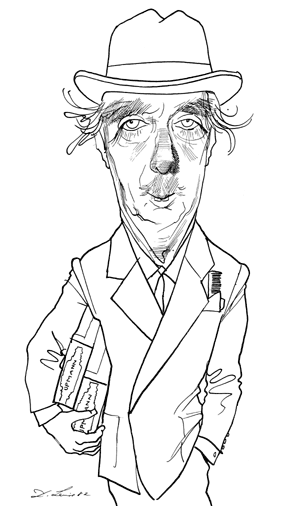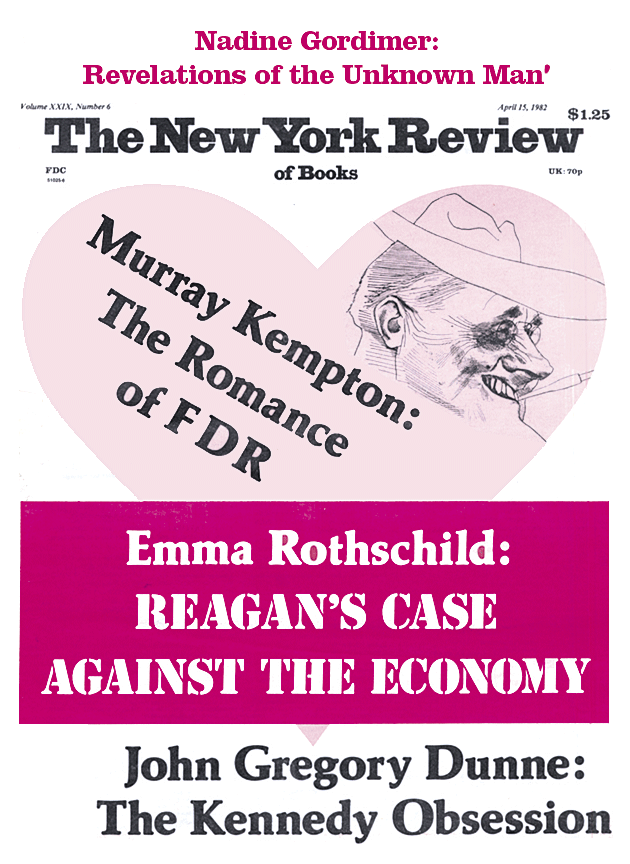Winston Churchill records that he only once spent a sleepless night of worry before and during the Second World War. That was on February 20, 1938, when he learned that Anthony Eden had resigned as foreign secretary. A tribute indeed to Eden as “the life-hope of the British nation.” David Carlton, Eden’s latest biographer, however, points out that in 1938 Churchill and Eden were rivals, not allies. The tribute, written more than ten years later, possibly contained “an element of hyperbole.” This little episode reveals the spirit of Carlton’s book, which is a systematic demolition of the Eden myth. The book is by no means a polemic. It is firmly based on a mass of sources: the official records, the diaries of Eden’s closest associates in the Foreign Office, and the papers of other cabinet ministers.
Eden had an aristocratic background to which he added an elegant air. He had a good war record which enabled him to appear as the representative of the younger generation. Elected to the House of Commons at the age of twenty-six, he at once found a constituency that remained staunchly Conservative even in 1945, the year of the great Labour landslide. Thus secured, he never troubled himself with home affairs and cast himself from the outset as an expert in diplomacy. From the first he had the air of a budding ambassador, an effect completed by the “Anthony Eden hat,” smart wear between the wars.
In the 1920s Eden was by no means the enlightened champion of the League of Nations that he seemed to become later. His maiden speech in 1924 asserted Trenchard’s doctrine of air bombardment as the way to win wars. With the establishment of the national government in 1931 Eden began his ministerial career as an assistant secretary to John Simon, the foreign secretary, and his first activity at Geneva was to make a case for Japan over Manchuria, much to the annoyance of Henry Stimson. Similarly, when the disarmament conference met, Eden had much sympathy with the German case. After visiting Hitler in Berlin, Eden wrote: “Without doubt the man has charm…. I find it very hard to believe that the man himself wants war…. I think we can trust the Chancellor [Hitler] not to go back on his word.” At this time Eden would surely have come under the heading of “appeaser.”
A change came with the Italo-Abyssinian war. As is well known, Samuel Hoare, recently made foreign secretary, joined with Laval in a plan to satisfy Mussolini by partitioning Abyssinia. Eden was a member of the cabinet that approved the Hoare-Laval plan. But when there was a public outcry Eden adroitly avoided any responsibility and soon succeeded the discredited Hoare at the Foreign Office. Eden was then thirty-eight years old, the youngest foreign secretary since the second Earl Granville in 1851. What was more, Eden had consolidated his reputation as the spokesman of the younger generation and the champion of Wilsonian principles.
Eden’s practice did not accord with his professions. He prevented the imposition of oil sanctions on Italy. He smoothed over the German reoccupation of the Rhineland and satisfied the French with a vague promise of staff talks. He promoted the line of neutrality and nonintervention in the Spanish civil war. In 1937, however, Stanley Baldwin, Eden’s patron, left office as prime minister. Neville Chamberlain, his successor, was by no means under the spell of Eden’s charm. Chamberlain dealt personally with Mussolini and Roosevelt. Eden’s vanity was hurt and he resigned. Again his reputation as the advocate of a firm line against the dictators was enhanced, though Eden had done little himself to enhance it.
Eden’s record over Czechoslovakia followed the same equivocal course. In private he often criticized Chamberlain and professed to be “deeply disturbed.” The nearest he got to a commitment was to walk out of the House of Commons when members were cheering Chamberlain, and he praised Chamberlain warmly when the crisis was over. By 1939, however, Eden was taking a strong line against Germany and even advocating an alliance with Soviet Russia. Mr. Carlton goes so far as to blame Eden for the subsequent alliance with Soviet Russia and says that without Eden the next war might have been between Germany and Soviet Russia with the Western powers rejoicing in neutrality. Historians should not run fantasies of what might have been, particularly when the fantasies clash with the spirit of the time.
The outbreak of war brought Eden back to office, but not to any great height: only Dominions secretary. Throughout the “phony war” Chamberlain largely ignored Eden. Even the fall of Chamberlain only elevated Eden to the War Office without a seat in the war cabinet. Eden invented the idea of local volunteers during the Battle of Britain, though their name of Home Guards was invented by Churchill. In less obvious ways Churchill and Eden were drawing closer together. In the autumn of 1940 Eden went to the Middle East and returned with the stirring secret that General Wavell was about to launch an offensive. Even better, in December Halifax, the foreign secretary, was induced to go to Washington as ambassador. Eden at last re-entered the portals of the Foreign Office. The partnership between Churchill and Eden had begun.
Advertisement
Churchill was always very much the boss and Eden was his willing chief executive. Early in their alliance Churchill made this promise: “I shall not make Lloyd George’s mistake and carry on after the war. The succession must be yours.” This was the bait that kept Eden loyal despite repeated disputes. For instance, Eden was the champion of General de Gaulle. President Roosevelt was hostile toward De Gaulle and Churchill always took his lead from the president. Fierce rows between Eden and Churchill followed. Harvey, Eden’s private secretary, noted on one occasion: “Frightful row, nervous exhaustion on both sides, then next day a rather contrite PM seeking to make up, like a schoolboy who knows he has been naughty.” Maybe Churchill appeared contrite but he always got his way. In particular, Churchill was not reconciled with De Gaulle until the autumn of 1944.
Churchill heaped responsibilities on Eden, perhaps because Eden was the safest person to quarrel with. In the autumn of 1940 Churchill even proposed to appoint Eden commander-in-chief in the Middle East, a strange idea indeed when Eden’s military experience was merely that of an infantry captain. In the early days of 1942, just after the fall of Singapore, Eden seems to have thought that his chance of supplanting Churchill was approaching. At any rate he consulted some politicians with long memories on how Asquith had been overthrown and replaced by Lloyd George in 1916.
Nothing came of this maneuver. Instead Churchill retaliated by appointing Eden leader of the House of Commons as well as foreign secretary. Eden staggered under the double burden and thought of escaping from it by becoming viceroy of India. He even consulted that forgotten figure Stanley Baldwin, who gave the oracular and ungrammatical advice, “When in doubt between two duties, it is wise to choose the most unpleasant one.” Eden remained at the Foreign Office, perhaps cowed by Churchill’s threat that he would take the Foreign Office himself—the only high office of state he had never held.
The most persistent disputes between Eden and Churchill, apart from De Gaulle, concerned relations with Soviet Russia. After Hitler’s attack on Russia, Eden was strongly pro-Soviet at the start and cooled off later; Churchill was cautious in the early days and became enthusiastic later. Their first dispute came over the Soviet demand, made even when the Germans were at the gates of Moscow, that the Western powers should recognize unconditionally the Soviet frontiers of 1941. Eden was for agreeing, Churchill against. Curiously, Molotov finally stilled the argument by agreeing to an Anglo-Soviet alliance without any mention of frontiers. In the end it was Churchill at Yalta who agreed to the Soviet demand.
Eden’s enthusiasm for Soviet Russia went so far that he tried to quieten the storm over the Katyn murders by pointing out quite accurately that the Nazi murder record was much worse. The problem of whether to repatriate the Russian prisoners of war held by the Germans arose sharply in the autumn of 1944. Eden has been much blamed over this. It is true that he wrote impatiently, “If these men don’t go back to Russia, where are they to go? We don’t want them here.” But this policy was endorsed by Churchill and the war cabinet. Stalin’s friendship was essential to victory, and, as was then thought, to a peaceful settlement of Europe. Eden for once merely formulated the general outlook of Churchill and his colleagues. Greece was supposed to be the British reward for surrender to repatriation. Still Eden’s query over the Soviet prisoners of war remains valid: “If these men don’t go back to Russia, where are they to go?” Much the same argument was used earlier by Eden and indeed by the entire British government regarding the refugee Jews: “Where are they to go? We don’t want them here.”
In the last months of the war Eden was again overshadowed by Churchill. It was Churchill, not Eden, who set the line at Yalta. When the European war ended Eden was in San Francisco preparing the way for the United Nations. Back in England he was involved in a general election, holding his seat without difficulty. But Labour won a decisive majority. Churchill resigned as prime minister. Sitting in the cabinet room after his last cabinet meeting Churchill said to Eden, “Thirty years of my life have been passed in this room. I shall never sit in it again. You will, but I shall not.” Here once more was the promise to Eden of the succession, a promise Churchill did not keep. I have one slight doubt. Eden and Churchill were alone. There was no witness to the promise. Did Churchill in fact ever make it? Or was it a figment of Eden’s imagination, created by his anxiety to succeed?
Advertisement
Whatever the explanation, Churchill did not withdraw from politics. On the contrary he sharply resented the attempts to dislodge him as Conservative leader and said fiercely: “All my most intimate friends recommend retirement and I will fight the lot till the bitter end and challenge them to sack me.” Actually it was unnecessary for Churchill to fight. The criticism of him in the Conservative Party scattered at the first roar. Churchill led the Conservative opposition for six years, with Eden doing most of the work. Then Churchill was prime minister from 1951 to 1955. At last in 1955 Eden became prime minister and his own master. A year later he showed himself a man of action. Was this an act of defiance against the chief who had humiliated him for so long? At all events the escapade of Suez was Eden’s ruin. This last episode in Eden’s career cannot be covered fully until the official British records are opened under the thirty-year rule, that is, in January 1987. Hence David Carlton promises an expanded and updated edition of his own book in that year. We shall welcome the reappearance of the Glamour Boy.
This Issue
April 15, 1982



